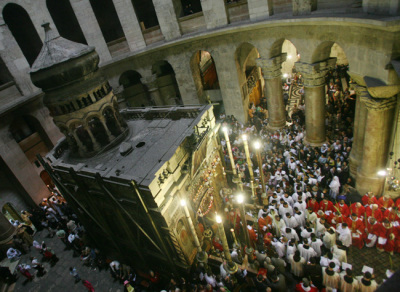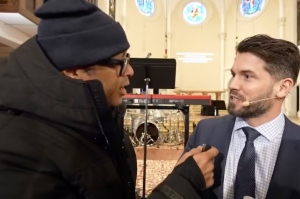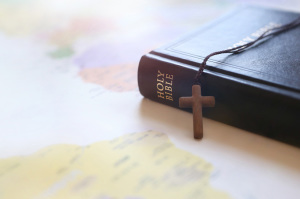There will be no more spitting at Christians

You may have seen it.
Last week, five misguided Israeli Jews came upon Christian pilgrims visiting Jerusalem from Asia, and they chose to spit, desecrating the spirit of the Holy City.
And what happened next was a textbook example of how a responsible nation handles such behavior.
Immediately, statements were issued by the Prime Minister, Foreign Minister, and Chief Rabbi of Israel condemning it.
The Prime Minister of Israel said, “We will have a zero-tolerance policy” for this behavior, and he promised to “take urgent steps against such actions.” Which he did. The perpetrators were arrested shortly thereafter.
Chief Rabbi David Lau called it a “desecration” and stated, “Such unacceptable behavior should not be associated with Jewish religious law in any way.”
The Foreign Minister, Eli Cohen, clarified that “this phenomenon does not represent the values of Judaism” and that religious freedom and tolerance will remain “a fundamental value in Israel.”
Israel’s Minister for Diaspora Affairs Amichai Chikli quoted Isaiah in his statement, noting that “my house should be called a house of prayer for all people” and assured Christians that Jerusalem will remain a city that will “embrace people of all religions.”
The statements kept coming from those in and out of government and from every corner of Israel.
Such swift, responsible action is exactly why Israel has become a safe haven for Christians, Muslims, and Jews in the Middle East, where such coexistence has been rare in modern history.
The Israeli government deserves commendation, not condemnation, for the situation. Interestingly, some critics of Israel were quick to share the video of the spitting incident yet have been slow to share the myriad condemnations. We also wonder if those same critics engage in such spirited condemnation when Jews are vilified and attacked.
Unfortunate moments like these are also instructive. They are a reminder of how much work is left to be done to make the world a place where all people of faith feel accepted.
While inexcusable, those not acquainted with the history of Christian antisemitism might not appreciate the miracle of the growing friendship between Jews and Christians. Yet not every Jew and not every Christian fully appreciates this miracle or properly respects the sincerely held beliefs of their neighbors. There are bridges still to be built between communities, bridges built best on shared values, and bridges more easily built in pluralistic Israel than in some lands.
These are also moments to reflect on those nations that do not act so swiftly and responsibly to protect the religious freedom of minority communities.
That is a long list.
The list includes some of Israel’s neighbors. The authorities in one country earlier this year got in the habit of confiscating the private religious items of Jews simply passing through, and at least two others allow the Iranian regime not only to incite hatred within their borders but to coordinate antisemitic terrorist attacks against the Jewish people.
Then there are Palestinians within the Holy Land who’ve violently attacked Jewish worshippers at Joseph’s Tomb, including some who have attempted to burn it to the ground on multiple occasions.
This week, the new Latin Patriarch of Jerusalem absurdly described the Gaza Strip as an open-air prison. Still, we suspect when he visits, he’ll enjoy accommodations at one of the luxurious hotels in Gaza. We doubt he’ll feel as free to wax eloquent about the condition of Christians there. He can give it a try, though, but he should start by asking why the Christians are almost gone in Gaza. Then, he can ask why Hamas still holds hostage the bodies of two Israeli soldiers in contravention of the three Abrahamic faiths.
The real, state-sponsored religious freedom violations proliferate the globe — not in Israel. What happened to those Christians who were spat upon was not the responsibility of the Israeli state but the crimes of individuals. The state addressed it, and religious leaders denounced it.
That’s good news.
There’s also other good news to give us hope that coexistence has a bright future, beginning in Riyadh.
That’s where the Israeli Minister of Communications, Shlomo Karhi, prayed Sukkot prayers this week, along with his delegation, as they traveled openly at the invitation of the Saudis. While in Riyadh, Minister Karhi visited an event that was once infamous to those of us who attend to cases of religious bigotry and antisemitism. Karhi went to the Riyadh Bookfair. Rather than being a place to survey all the latest antisemitism published over the last year, it is different now.
This year, the talk of the town was an ancient Torah scroll on grand display opened precisely to exact text read by Jews all over the world during Sukkot — an unexpected act of Arab hospitality extended not only to a Jew but to an Israeli Jew.
These are words we never thought we would write, but they are true: a Jew with a Kippah is probably safer walking in the streets of Saudi Arabia now than in large portions of Europe.
The path to tolerance is sometimes a rocky road.
Mistakes and missteps happen in democracies, too, but we all have the power to construct our bridges to those different from us. These days, those bridges may be more easily built in the east than in the west. This is something to celebrate and also to mourn.
Rabbi Abraham Cooper is the associate dean and director of the Global Social Action Agenda at the Simon Wiesenthal Center and chair of the U.S. Commission for International Religious Freedom.
Rev. Johnnie Moore is president of the Congress of Christian Leaders and former two-time Commissioner on the U.S. Commission for International Religious Freedom.



























